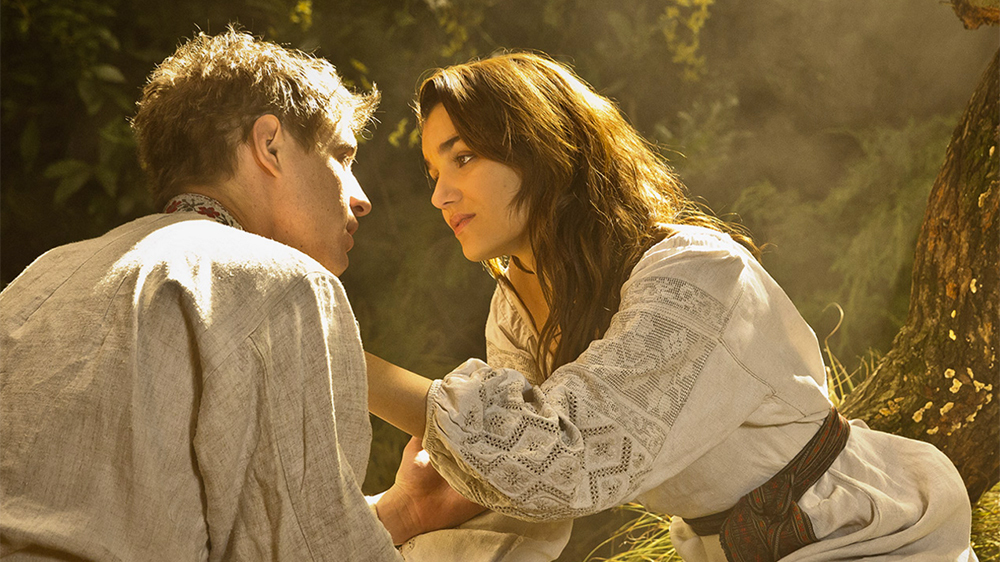BITTER HARVEST
Roadside Attractions
Reviewed by: Harvey Karten, Shockya
Grade: C+
Director: George Mendeluk
Written by: Richard Bachynsky-Hoover, George Mendeluk
Cast: Max Irons, Tom Austen, Samantha Barks, Richard Brake, Aneurin Barnard, Tamer Hassan, William Beck
Screened at: Review 1, NYC, 2/13/17
Opens: February 24, 2017
Wouldn’t it be nice if we could call 20th Century’s Communist rulers clowns and fools? But clowns and fools make people laugh and cause little harm, except for hurt feelings among those they satirize. An extensive list of Communist rulers in the last century is like a rogue’s gallery of horror: people who through purges, unjust executions, famines caused by collectivization, are responsible for deaths and misery from the tens of thousands to the tens of millions. Think Pol Pot, Lenin, Mao, Enver Hoxha of Albania, the Kim dynasty in North Korea, Ceausescu in Romania. The only Communist in the former Soviet Union who could be called a mensch is Mikhail Gorbachev. While Stalin is credited with winning the war against Hitler, his nickname “Uncle Joe” is absurd. Hardly avuncular, he ruled in the Soviet Union responsible for millions of deaths of his own people by starvation, political purges of his opponents, and wholesale imprisonments in the far reaches of Siberia. “Bitter Harvest” takes on Stalin for the paranoid monster that he was, superimposing a love story over reenactments of political mayhem at Stalin’s boot.
Bolsheviks like Lenin may have started out as reformers, granting universal free public education, women’s rights and the like, but in their attempt to go against human nature—the desire for ownership, for a free market, and more or less freedom from unjustified government interference—Communism’s social engineering has been a failure everywhere. Look at Ukraine as an example. George Mendeluk who directed “Bitter Harvest” does so, making use of a screenplay and story from Richard Bachynsky-Hoover and George Mendeluk. In 1932, the Soviet Union, having caused millions of deaths in grain-producing areas of their own country, proceeds to do likewise in Ukraine.
What happened to Ukraine under Soviet domination during the early 1930’s was unknown in the outside world until the breakup of the Soviet Union in 1991. Have you ever heard of Holodomor? The term looks like “Holocaust” and to some extent it was. Soviet soldiers occupying Ukraine over eight decades ago took over the land of the kulaks, who were unfairly called “the rich,” stealing their grain and giving the farmers quotas to fill before allowing them to continue producing for their own families. The collectivization of formerly private farms under state control led to famine and to armed resistance by Ukrainians. To put down the resistance “Uncle Joe” Stalin stepped up repression orders, which led to further resistance. “Bitter Harvest” does OK cinematically in illustrating actions and reactions, but fails to contribute an authentic-sounding dialogue, i.e. screenplay, inhabiting the characters with stilted and laughable “heroic” talk and a love story that could have come out of a Harlequin romance for tenth graders.
What’s more, everyone speaks the King’s English, not Ukrainian or Russian, and the arch-villain is a cartoon cutout.
Simply: Yuri (Max Irons) has been in love with Natalka (Samantha Barks) since childhood. They swim in the local, unpolluted waters. They kiss even though at that stage they must be no more than ten years ago, an age that boys usually run away from girls. Yuri gets pep talks from his grandfather Ivan (Terence Stamp) on the importance of freedom, and advises that if the Bolsheviks are coming, the bell in the (presumably) Eastern Orthodox church would ring out to alert the farmers.
The Bolsheviks do come and now Yuri and Natalka are now young adults still in love. Yuri figures on making a living at least after the liberation as an artist. Traveling to Kiev and leaving his sweetheart behind for the time being, he attends art school where his teacher furiously knocks down the poor guy’s palette because his paintings are too realistic. He delves into impressionism and cubism only to be kicked by the Soviet overseer for a lack realism. From time to time, his extended family back home fires on the Soviet soldiers, who line them up before firing squads, pummel and kick them, tie their arms with ropes to the ceiling, and preside over the steady starvation of the farmers.
Bodies abound: on trains, in the fields, in the shooting galleries while speeches are given, soldiers are resisted, heroes are made and heroes are killed. Given Yuri’s nature, which under the circumstances is effete, our focus is on the principal villain, Sergei (Tamer Hassan), who kicks people, kills them, and seduces Yuri’s main squeeze Natalka, advising her to be nice if she wants to save her family. She washes his feet and dries them with her hair, which buys enough time for the fireworks to commence in the blazing conclusion.
Lacking much in the way of authentic acting and dialogue, we rely at least on the bold cinematography. The film should be held if only to publicize the cruelty of the Soviets, who allowed Ukrainian independence for a while after the First World War, then colonized the country, ultimately letting go in 1991 when the Soviet Union fell apart. Remember the Holodomor!
Rated R. 103 minutes. © Harvey Karten, Member, New York Film Critics Online
Comments, readers? Agree? Disagree? Why?
Story – C-
Acting – C+
Technical – B
Overall – C+

